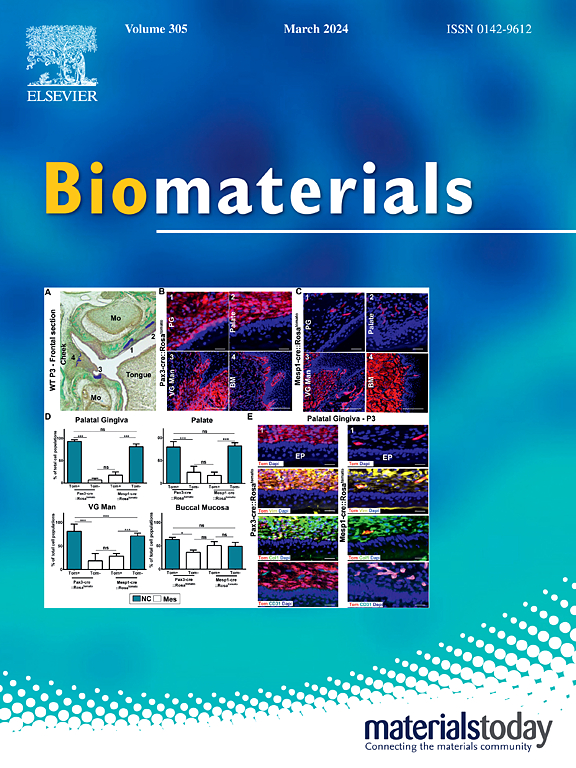A cationic main-chain poly(carbonate-imidazolium) potent against Mycobacterium abscessus and other resistant bacteria in mice
IF 12.8
1区 医学
Q1 ENGINEERING, BIOMEDICAL
引用次数: 0
Abstract
The incidence of serious lung infections due to Mycobacterium abscessus, a worrying non-tuberculosis mycobacteria (NTM) species, is rising and has in some countries surpassed tuberculosis. NTM are ubiquitous in the environment and can cause serious lung infections in people who are immunocompromised or have pre-existing lung conditions. M. abscessus is intrinsically resistant to most antibiotics. Current treatments involve combination of three or more repurposed antibiotics with the treatment regimen lasting at least 12 months but producing unsatisfactory success rates of less than 50 %. Herein, we report an alternative strategy using a degradable polymer, specifically main-chain cationic carbonate-imidazolium-derived polymer (MCOP-1). MCOP-1 is a non-toxic agent active in a murine lung infection model. MCOP-1 also exhibits excellent efficacy against multi-drug resistant (MDR) ESKAPE bacteria. MCOP-1 damages bacterial membrane and DNA, and serial passaging does not rapidly elicit resistance. Its carbonate linkage is stable enough to allow MCOP-1 to remain intact for long enough to exert its bactericidal effect but is labile over longer time periods to degrade into non-toxic small molecules. These findings underscore the potential of degradable MCOP-1 as a promising therapeutic antimicrobial agent to address the growing incidence of recalcitrant infections due to M. abscessus and MDR ESKAPE bacteria.
一种阳离子主链聚(碳酸盐-咪唑)对小鼠脓肿分枝杆菌和其他耐药细菌有效。
由脓肿分枝杆菌(一种令人担忧的非结核分枝杆菌)引起的严重肺部感染的发病率正在上升,在一些国家已超过结核病。NTM在环境中无处不在,可在免疫功能低下或已有肺部疾病的人群中引起严重的肺部感染。脓肿分枝杆菌本质上对大多数抗生素具有耐药性。目前的治疗包括联合使用三种或三种以上的抗生素,治疗方案持续至少12个月,但成功率低于50%,令人不满意。在此,我们报告了一种替代策略,使用可降解聚合物,特别是主链阳离子碳酸盐-咪唑衍生聚合物(mcp -1)。mcp -1是一种在小鼠肺部感染模型中具有活性的无毒药物。mcp -1对多药耐药(MDR) ESKAPE细菌也表现出优异的疗效。mcp -1破坏细菌膜和DNA,序列传代不能迅速引起耐药性。它的碳酸盐连接足够稳定,可以使mcp -1保持完整足够长的时间以发挥其杀菌作用,但在较长时间内却不稳定,无法降解成无毒的小分子。这些发现强调了可降解mcp -1作为一种有前景的治疗性抗菌药物的潜力,以解决由脓肿分枝杆菌和耐多药ESKAPE细菌引起的难治性感染日益增加的发生率。
本文章由计算机程序翻译,如有差异,请以英文原文为准。
求助全文
约1分钟内获得全文
求助全文
来源期刊

Biomaterials
工程技术-材料科学:生物材料
CiteScore
26.00
自引率
2.90%
发文量
565
审稿时长
46 days
期刊介绍:
Biomaterials is an international journal covering the science and clinical application of biomaterials. A biomaterial is now defined as a substance that has been engineered to take a form which, alone or as part of a complex system, is used to direct, by control of interactions with components of living systems, the course of any therapeutic or diagnostic procedure. It is the aim of the journal to provide a peer-reviewed forum for the publication of original papers and authoritative review and opinion papers dealing with the most important issues facing the use of biomaterials in clinical practice. The scope of the journal covers the wide range of physical, biological and chemical sciences that underpin the design of biomaterials and the clinical disciplines in which they are used. These sciences include polymer synthesis and characterization, drug and gene vector design, the biology of the host response, immunology and toxicology and self assembly at the nanoscale. Clinical applications include the therapies of medical technology and regenerative medicine in all clinical disciplines, and diagnostic systems that reply on innovative contrast and sensing agents. The journal is relevant to areas such as cancer diagnosis and therapy, implantable devices, drug delivery systems, gene vectors, bionanotechnology and tissue engineering.
 求助内容:
求助内容: 应助结果提醒方式:
应助结果提醒方式:


